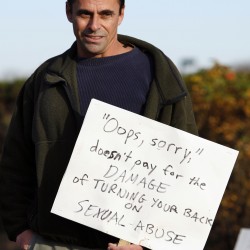By Seth Koenig
Bangor Daily News
November 22, 2011
http://bangordailynews.com/2011/11/22/news/portland/victims-of-cheverus-sex-abuse-seek-resolution-see-ties-to-penn-state-scandal/
 |
| Rick Romano protests in support of victims of sexual abuse in front of Chevrus High School, Tuesday, Nov. 22, 2011, in Portland. Buy Photo |
 |
| John Clark, a victim of sexual abuse as a minor, protests in front of Chevrus High School, Tuesday, Nov. 22, 2011, in Portland. Buy Photo |
 |
| Rick Romano (left) and Bill Slavick protest in support of victims of sexual abuse in front of Chevrus High School, Tuesday, Nov. 22, 2011, in Portland. Buy Photo |
The victims in a sexual abuse scandal that shook Cheverus High School more than a decade ago claimed Tuesday the Portland Jesuit school recently withdrew an offer to enter into mediation with the former students.
The development in the Cheverus case comes in the shadow of high-profile allegations that former Penn State University assistant football coach Jerry Sandusky sexually assaulted multiple children, carrying public awareness about child sex abuse to a new high.
John Clark is a Portland photographer who is one of almost a dozen former Cheverus High School students represented by an attorney who is seeking compensation for abuse perpetrated by longtime teacher and track coach Charles Malia.
The allegations against Malia, and his subsequent admission of guilt and resignation, came to light in the late 1990s. The legal deadline for prosecuting him for the crimes had run out, however, and he never was charged. The scandal led to a move by the state Legislature to waive the statute of limitation for rape cases.
But without criminal charges to pursue against the former coach and educator, Clark said a group of victims in recent months believed they were at least taking steps toward receiving compensation for the damages Malia caused them. That was until “a couple of weeks ago,” when he said Cheverus attorneys rescinded an offer to enter into mediation with the victims, a process Clark said the former students believed ultimately would lead to potential financial compensation.
Clark, whose older brother also allegedly was assaulted by Malia, said he doesn’t know what legal step the group will take now.
“People may have thought the damage was repaired by now, and steps had been taken to repair it,” he said, but [Cheverus representatives] “haven’t taken the steps to make things right by us, adequately at all.”
In a two-page response to the protest issued by the school, Cheverus stated, “the current board of trustees, the administration, the faculty and the staff acknowledge the pain and suffering experienced by those who continue to endure the effects of the sexual abuse perpetrated upon them” by Malia and another school figure, the retired Father James Talbot. The statement says the abuse “remains a sad and well publicized part of Cheverus’ past,” and lists steps the institution has taken since the allegations became public, such as offering to pay for counseling for any victims, removing Malia’s name from the school track, and adding preventative steps such as increased background checks and required training for coaches and teachers.
“Cheverus supports the right of these victims to continue to remind us of the events that took place 30 or 40 years ago,” the statement continued. “It is through continued education and vigilance that we can prevent these abuses from ever happening again.”
Rick Romano, 57, who graduated from Cheverus in 1972, joined Clark among six protesters who held signs outside of the Ocean Avenue school Tuesday afternoon. Also on hand was Robert Gossart, who was sexually abused as a student in Belgium in the 1940s and 1950s and stood in support of the Cheverus graduates.
Romano said he’s not one of the victims seeking compensation, in part because he was always able to fight off Malia’s sexual advances.
Romano said Malia would surprise students who were showering after gym classes and offer rubdowns for track athletes after workouts.
“While we were showering, Charles Malia would pull the curtains back, jump in and try to grab us,” he said.
When he told Malia to stop and pushed him away, the coach “found other ways to torture me.”
Romano said Malia would pull him out of classes and bring him to the locker room alone, force him to pull his pants down and beat him.
Looking back, that’s where he said he sees the greatest parallels to the situation at Penn State, where other coaches and school administrators learned about the alleged conduct but failed to take enough action to stop it.
“A teacher discovered me one day huddled in the corner of the locker room,” Romano said, declining to name the teacher. “I was hiding because I was ashamed. He saw my bloodied bottom and asked who did it to me. I told him and he ran from the room. From that day on, the beating stopped, but Malia moved on to psychological games.”
When his sports teammates voted him most valuable player, Romano said, coach Malia ordered them to revote, over and over, until the teammates finally got the message and picked a different player for the honor.
Malia continued working at the school and no disciplinary action was taken against him, Romano said.
“When adults who are in charge don’t take the initiative to stop these types of predators, children get hurt,” he said.
One of the signs carried by protesters Tuesday read: “What happened at Penn State happened right here at Cheverus. They looked the other way.”
Any original material on these pages is copyright © BishopAccountability.org 2004. Reproduce freely with attribution.